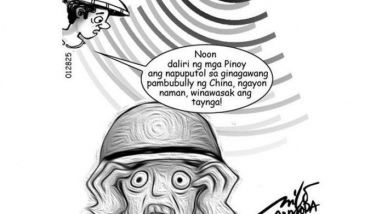When a dropout addresses university graduates
This season of commencement exercises, a venerable and respectable tradition especially at elite universities, bring to mind a list of memorable addresses: Barack Obama’s lecture at Wesleyan University in 2008; Nobel Laureate Elie Wiesel’s talk at DePaul University in 1997; Czech Republic President Vaclav Havel’s lecture on “Civilization’s Thin Veneer” at Harvard University in 1995; George Marshall’s address at the same institution in 1947.
While he was the CEO of Apple Computer and Pixar Animation Studios, Steve Jobs delivered the most unforgettable and touching address on June 12, 2005 at Stanford University. His classic admonition that humbled the highly intellectual and ambitious university graduates right from his opening statement remains memorable even after his passing in Oct. 5, 2011 at the age of 56.
Steve Jobs’ address to the intellectuals of Stanford
“I am honored to be with you today at your commencement from one of the finest universities of the world. I never graduated from college. Truth be told, this is the closest I’ve ever gotten to a college graduation.
Today, I want to tell you the story of my life. I dropped out of Reed College (Portland, Oregon) after six months, but then stayed around as a drop-in for another 18 months or so before I really quit. So, why did I drop out?”
Jobs decided to drop out of his college because he refused to be restricted by required courses that did not interest him. Instead, he dropped in on the classes that interested him. “It wasn’t all romantic. I didn’t have a dorm room, so I slept on the floor in friends’ rooms … I would walk the seven miles across town every Sunday night to get one good meal a week at the Hare Krishna temple.”
One of the classes Jobs chose to drop in was a calligraphy course that Reed College was known for. “I learned about serif and sans serif typefaces, about varying and the amount of space between different letter combinations, about what makes great typography great. … None of this had any hope of practical application in my life. But 10 years later, when we were designing the first Macintosh computer, it all came back to me. And we designed it all into the Mac. It was the first computer with beautiful typography.”
He materialized a vision and abruptly lost it
At 20, Steve Jobs and his friend, Steve Wozniak started Apple in his parents’ garage. Within 10 years, it grew into a $2 billion company with over 4,000 employees. He hired an experienced CEO of Pepsi, John Sculley, so he would be free to create great products. However, when their visions diverged, Jobs found himself fired, “a very public failure.” For months he was in a limbo, but he snapped out of it and started over.
“The heaviness of being successful was replaced by the lightness of being a beginner again, less sure of everything. It freed me to enter the most creative periods of my life.” In the next five years, Jobs founded NeXT and Pixar, which became the most successful animation studio in the world.
“Sometimes life hits you in the head with a brick. Don’t lose faith. I’m convinced that the only thing that kept me going was that I loved what I did. … And the only way to do great work is to love what you do. If you haven’t found it yet, keep looking. Don’t settle.”
Live each day as if it was your last
At 17, Jobs read a quote: “‘If you live each day as if it was your last, someday you’ll most certainly be right.’ It made an impression on me, and since then, for the past 33 years, I have looked in the mirror every morning and asked myself: ‘If today was the last day of my life, would I want to do what I am about to do today?’”
In 2004, Jobs was diagnosed with a very rare form of pancreatic cancer. “My doctor advised me to go home and get my affairs in order, which is doctor’s code for prepare to die. It means to try to tell your kids everything you thought you’d have the next 10 years to tell them in just a few months. It means to make sure everything is buttoned up so that it will be as easy as possible for your family. It means to say your goodbyes.
“No one wants to die. Even people who want to go to heaven don’t want to die to get there. And yet death is the destination we all share. No one has ever escaped it. That is as it should be, because death is very likely the single best invention of Life. It is Life’s change agent. It clears out the old to make way for the new. Right now the new is you. But someday, not too long from now, you will gradually become the old and be cleared away. Sorry to be so dramatic, but it is quite true.”
Don’t let the noise of others’ opinions drown out your inner voice
“Your time is limited, so don’t waste it living someone else’s life. Don’t be trapped by dogma – which is living with the results of other people’s thinking.”
Jobs never let the opinions of others drown out his “inner voice.” One time the Apple design team presented him with the first version of the iPod. He turned it over and over and weighed it in his hand and said, “It’s too big.” The engineers protested that it was a miracle of state-of-the-art miniaturization, 1,000 songs packed into a tiny space. Jobs walked to the fish tank and dropped the prototype into the water. He pointed to the bubbles floating from it to the surface and said, “That means there’s still some space in it. It’s too big.” The modified version was reduced to the 2.4” by 4.1” model.
Stay hungry, stay foolish
Jobs concluded his commencement address by recalling an amazing publication in the late ‘60s, The Whole Earth Catalog by Stewart Brand. Brought to life before personal computers and desktop publishing, it was more like a paperback version of Google before Google was discovered. After putting out several issues for a generation that considered it one of its bibles, it ran its course and put out a final issue. “It was the mid ‘70s, and I was your age. On the back cover of their final issue was a photograph of an early morning country road, the kind you might find yourself hitchhiking on if you were so adventurous. Beneath it were the words: ‘Stay hungry. Stay foolish.’ It was their farewell message as they signed off. … I have always wished that for myself. And now, as you graduate to begin anew, I wish that for you. Stay hungry. Stay foolish. Thank you all very much.”
(For feedback email to [email protected])
- Latest




























